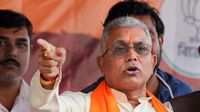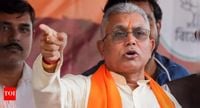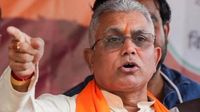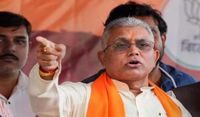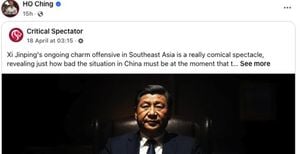In a controversial statement that has ignited a political firestorm in West Bengal, senior BJP leader Dilip Ghosh has urged Hindus to keep weapons at home for their protection. His remarks, made during a public rally in the North 24 Parganas district, come in the wake of violent clashes in Murshidabad that resulted in the deaths of three individuals. Ghosh's comments have drawn sharp rebuke from opposition parties, particularly the ruling Trinamool Congress (TMC), which labeled his statements as "provocative".
Ghosh, a former chief of the West Bengal BJP, was addressing a gathering when he remarked, "Hindus are buying television sets, refrigerators, and new furniture. But they don't have a single weapon at home. When something happens, they keep calling the police. The police will not save you." His comments were made in light of recent violence in Murshidabad, which has been marred by protests against the Waqf Amendment Act.
He further emphasized the need for unity among Hindus, stating, "Ten years ago, people didn't know what Ram Navami processions were. Today, such processions are being held in every locality because Hindus have realised they need to unite. Even God doesn't stand by the weak." However, the authenticity of the video capturing these remarks has not been independently verified, raising questions about the context in which they were made.
The backlash to Ghosh's statements was swift. TMC MLA Humayun Kabir, representing Murshidabad, accused Ghosh of inciting communal discord. "If one person attacks another, there will be retaliation. These BJP leaders are using religion to provoke Hindus and disrupt West Bengal's harmony and culture," Kabir asserted. His comments reflect a broader concern among opposition leaders that Ghosh's rhetoric could further inflame tensions in a region already on edge.
The recent violence in Murshidabad has left at least three people dead and hundreds displaced, as clashes erupted during protests against the Waqf Amendment Act. This law has been contentious, particularly among the Hindu community, who fear it could lead to the appropriation of land and resources. In response to the unrest, central forces have been deployed, internet services have been suspended, and over 200 individuals have been arrested for their alleged involvement in the violence.
Ghosh's remarks have not only reignited debates about communal tensions in West Bengal but have also drawn attention to the political strategies employed by the BJP in the state. The party has often been accused of using religious sentiments to consolidate its base among Hindu voters, especially in areas where communal harmony is fragile.
Political analysts suggest that Ghosh's call for Hindus to arm themselves could be seen as a desperate attempt to rally support amid rising discontent with the BJP's handling of communal issues. Critics argue that such statements could exacerbate existing divisions and lead to further violence, especially in a state like West Bengal, which has a complex history of communal relations.
In the wake of Ghosh's comments, many are left wondering about the implications for communal harmony in West Bengal. The TMC's strong condemnation of his statements indicates that the ruling party is keen to distance itself from any notion of complicity in stirring communal tensions. Kabir's remarks serve as a reminder that the stakes are high in a region where political and religious identities are deeply intertwined.
As the political landscape continues to evolve in West Bengal, the fallout from Ghosh's statements will likely be felt in the coming days. With elections on the horizon, the BJP's approach to communal issues will be closely scrutinized, and how the party navigates this controversy could have significant implications for its electoral prospects.
In conclusion, Dilip Ghosh's call for Hindus to keep weapons at home has sparked a significant political controversy in West Bengal, highlighting the delicate balance of communal relations in the state. As tensions remain high following the recent violence in Murshidabad, both the BJP and TMC will need to tread carefully in their rhetoric and actions to avoid further inflaming an already volatile situation.
